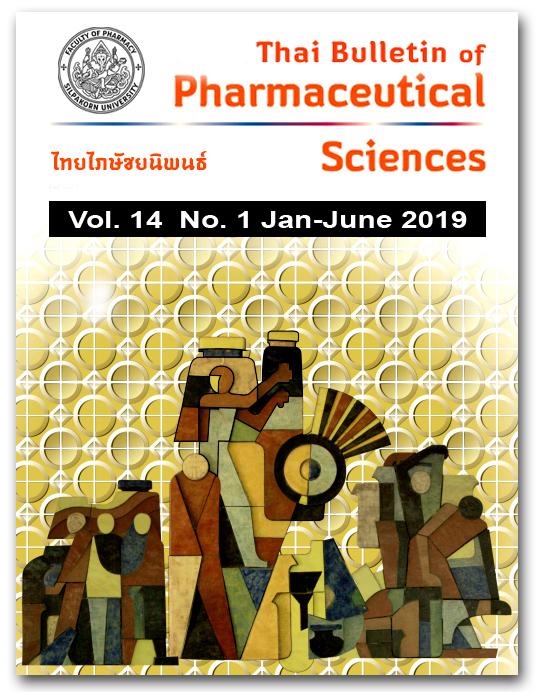SWITCHING TO AND FROM VARIOUS ANTICOAGULANTS: A MANAGEMENT STRATEGY FOR CLINICIANS
DOI:
https://doi.org/10.69598/tbps.14.1.95-110Keywords:
switching/transitioning of anticoagulants, parenteral anticoagulants, oral anticoagulantsAbstract
Anticoagulant therapy has long been the gold standard therapy for stroke and/or systemic embolic prevention and treatment. Anticoagulants generally include parenteral anticoagulants that are extensively used in acute situations for an immediate anticoagulant effect, and oral anticoagulants which are used for long-term therapy. Warfarin has been one of the only oral anticoagulants available during in the past 60 years. In recent years, a new generation of oral anticoagulants has been introduced which is challenging thromboembolic prevention and treatment. Switching to and from various anticoagulants are common situations in clinical practices. Individual’s thromboembolic and bleeding risk assessment should be assessed before switching. Moreover, the pharmacokinetic profile of each anticoagulant is also important to guide the best way for anticoagulant switching. For example, patients with a high thromboembolic risk or patients who switch to warfarin that have a slow onset should be given a parenteral anticoagulant for bridging therapy to prevent thromboembolic events. However, the initial bolus of heparin may be omitted for transitioning to heparin infusion in patients with a high bleeding risk.
References
2. Ortel TL. Perioperative management of patients on chronic antithrombotic therapy. Blood. 2012;120(24):4669-705.
3. Lane DA, Lip GYH. Use of the CHA2DS2-VASc and HAS-BLED scores to aid decision making for thromboprophylaxis in nonvalvular atrial fibrillation. Circulation. 2012;126(7):860-5.
4. Lip GY, Nieuwlaat R, Pisters R, Lane DA, Crijns HJ. Refining clinical risk stratification for predicting stroke and thromboembolism in atrial fibrillation using a novel risk factor-based approach: the euro heart survey on atrial fibrillation. Chest. 2010;137(2):263–72.
5. Alquwaizani M, Buckley L, Adams C, Fanikos J. Anticoagulants: A review of the pharmacology, dosing, and complications. Curr Emerg Hosp Med Rep. 2013;1(2):83-97.
6. Raval AN, Cigarroa JE, Chung MK, Diaz-Sandoval LJ, Diercks D, Piccini JP, et al. Management of patients on non-vitamin K antagonist oral anticoagulants in the acute care and periprocedural setting: a scientific statement from the American Heart Association. Circulation.2017; 135(10): e604-33.
7. Steffel J, Verhamme P, Potpara TS, Albaladejo P, Antz M, Desteghe L, et al. The 2018 European Heart Rhythm Association Practical Guide on the use of non-vitamin K antagonist oral anticoagulants in patients with atrial fibrillation: executive summary. Europace. 2018;20(8): 1231-42.
8. Patel MR, Hellkamp AS, Lokhnygina Y, Piccini JP, Zhang Z, Mohanty S, et al. Outcomes of discontinuing rivaroxaban compared with warfarin in patients with nonvalvular atrial fibrillation: analysis from the ROCKET AF trial (Rivaroxaban Once-Daily, Oral, Direct Factor Xa Inhibition Compared With Vitamin K Antagonism for Prevention of Stroke and Embolism Trial in Atrial Fibrillation). J Am Coll Cardiol. 2013;61(6):651-8.
9. Granger CB, Lopes RD, Hanna M, Ansell J, Hylek EM, Alexander JH, et al. Clinical events after transitioning from apixaban versus warfarin to warfarin at the end of the Apixaban for Reduction in Stroke and Other Thromboembolic Events in Atrial Fibrillation (ARISTOTLE) trial. Am Heart J. 2015;169(1):25-30.
10. Ruff CT, Giugliano RP, Braunwald E, Mercuri M, Curt V, Betcher J, et al. Transition of patients from blinded study drug to open-label anticoagulation: the ENGAGE AF-TIMI 48 trial. J Am Coll Cardiol. 2014;64(6):576-84.
11. ELIQUIS® (apixaban) [Package Insert]. Princeton (NJ): Myers Squibb; 2015.
12. PRADAXA® (dabigatran etexilate mesylate) [Package Insert]. Ridgefield (CT): Boehringer Ingelheim Pharmaceuticals; 2014.
13. SAVAYSA® (edoxaban) [Package Insert]. Tokyo: Daiichi Sankyo; 2015.
14. XARELTO® (rivaroxaban) [Package Insert]. Titusville (NJ): Janssen Pharmaceuticals; 2013.
15. Mahaffey KW, Wojdyla D, Hankey GJ, White HD, Nessel CC, Piccini JP, et al. Clinical outcomes with rivaroxaban in patients transitioned from vitamin K antagonist therapy: a subgroup analysis of a randomized trial. Ann Intern Med. 2013;158(12):861-8.
16. Hellerslia V, Mehta P, Rudd K. Transition of Anticoagulants 2016 [Internet]. St. Louis (MO): Thomas Land; c2006-2018 [cited 2018 Apr 3]. Available from: http://www.thomasland.com/AnticoagTransitions_ 2016.pdf
17. Minneapolis Heart Institute. Switching to and from various anticoagulants [Internet]. Minneapolis (MN): The Institute; 2016. [cited 2018 Apr 3]. Available from: http://www.mplsheart.com/wp-content/uploads/2017/07/ Switching%20To-From%20Anticoagulants.pdf
18. Abo-Salem E, Becker R. Transitioning to and from the novel oral anticoagulants: a management strategy for clinicians. J Thromb Thrombolysis. 2014;37(3):372-9.
Downloads
Published
How to Cite
Issue
Section
License
All articles published and information contained in this journal such as text, graphics, logos and images is copyrighted by and proprietary to the Thai Bulletin of Pharmaceutical Sciences, and may not be reproduced in whole or in part by persons, organizations, or corporations other than the Thai Bulletin of Pharmaceutical Sciences and the authors without prior written permission.



